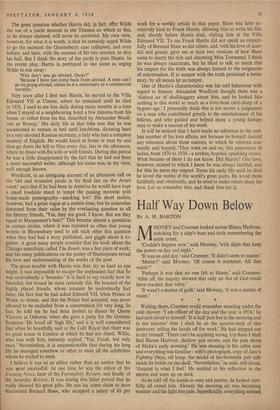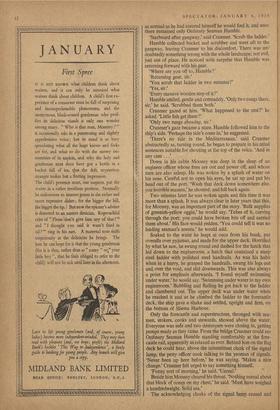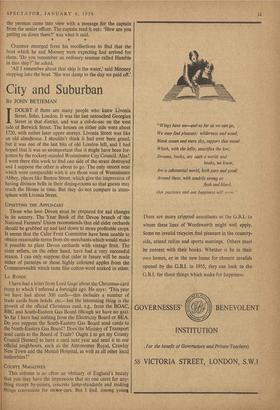Half Way Down Below
By A. H. BARTON MOONEY and Cranmer looked across Sliema Harbour, watching for a ship's boat and each remembering the same event. 'Couldn't happen now,' said Mooney, 'with ships that keep the power on day and night.'
'It was an odd day,' said Cranmer. 'It didn't seem to matter.' 'Matter!' said Mooney. 'Of course it mattered. All that water?'
'Perhaps it was that no one felt to blame,' said Cranmer. 'After all, the inquiry showed that only an Act of God could have cracked that valve.'
'It wasn't a matter of guilt,' said Mooney, 'it was a matter of water.'
* * * Waiting there, Cranmer could remember standing under the cold shower. 'I am officer of the day and the year is 1934,' he had said aloud to himself. 'It is half past five in the morning and in ten minutes' time I shall be on the quarter-deck of this • destroyer, telling the hands off for work.' He had stepped out to dry himself. 'There can't be anything wrong. Up there I shall find Sliema Harbour, shallow and secure, and the pale shore of Malta's early morning.' He was dressing in his cabin now and everything was familiar : wife's photograph, copy of Jane's Fighting Ships, oil lamp, the model of his 'favourite pub safe inside its bottle on the shelf. 'Nevertheless,' he said, still aloud, 'disquiet is what I feel.' He nodded to his reflection in the mirror and went up on deck.
As he told off the hands in ones and parties, he looked care- fully all round him. Already the morning air was becoming warmer and the light less pale. Superficially, everything seemed as normal as he had assured himself he would find it, and soon there remained only Ordinary Seaman Hamble.
'Starboard after gangway,' said Cranmer. 'Scrub the ladder.' Hamble collected bucket and scrubber and went aft to the gangway, leaving Cranmer to his disComfort. There was un- doubtedly something wrong with the whole landscape; not evil, just out of place. He noticed with surprise that Hamble was returning forward with his gear.
'Where are you off to, Humble?'
'Returning gear. sir.'
'You scrub that ladder in two minutes?'
'Yes, sir.'
'Every massive wooden step of it'?'
Hamble smiled, gentle and comradely. 'Only two rungs there. sir,' he said. 'Scrubbed them both.'
Cranmer gazed at him. 'What happened to the rest?' he asked. `Little fish get them?'
'Only two rungs showing, sir.'
Cranmer's gaze became a stare. Hamble followed him to the ship's side. 'Perhaps the tide's come in,' he suggested.
'There's no tide in the Mediterranean,' said Cranmer abstractedly as, turning round, he began to prepare in his mind sentences suitable for shouting at the top of the voice. 'And in any case ..
Down in his cabin Mooney was deep in the sleep of an engineer officer whose fires are out and power off, and whose men arc also asleep. He was woken by a splash of water on his nose. Careful not to open his eyes, he sat up and put his head out of the port. 'Wash that deck down somewhere else, N'ou horrible seamen,' lie shouted; and fell back again.
Two minutes later he was woken again and this time it was more than a splash. It was always clear in later years that this, for Mooney, was an important part of the story. 'Bulk supplies of greenish-yellow oggin,' he would say. 'Tubes of it, curving through the port; you could have broken bits off and carried them about.' His face would redden. 'You could tell it was no leading seaman's sneeze,' he would add.
Soaked to the waist he leapt at once from his bunk, put overalls over pyjamas, and made for the upper deck. Horrified by what he saw, he swung round and dashed for the hatch that led down to the engineroom, a hatch that contained a steep steel ladder with polished steel handrails. As was his habit when in a hurry, he grasped the handrails, swung his legs out and over the void, and slid downwards. This was also always a point for emphasis afterwards. 'I found myself swimming under water: he would say. 'Swimming under water in my own engineroom.' Bubbling and flailing he got back to the ladder and clambered out. The upper deck was under water when he reached it and as he climbed the ladder to the forecastle deck, the ship gave a shake and settled, upright and firm, on the bottom of Slierna Harbour.
Only the forecastle and superstructure, thronged with sea- men, stokers, cooks and stewards, showed above the water. Everyone was safe and two destroyers were closing in, getting pumps ready as they came. From the bridge Cranmer could see Ordinary Seaman Hamble standing comfortably at the fore- castle rail, apparently as relaxed as ever. Behind him on the flag deck he could hear, above the intermittent clank of the signal lamp, the petty officer cook talking to the yeoman of signals. `Never been up here before,' he was saying. 'Makes a nice change.' Cranmer felt urged to say something himself.
"Funny sort of morning,' he said. 'Unreal.'
Beside him Mooney cleared his throat. 'Nothing unreal about that block of ocean on my chest,' he said. 'Must have weighed a hundredweight. Solid sea.'
The acknowledging clanks of the signal lamp ceased and the yeoman came into view with a message for the captain from the senior officer. The captain read it out: 'How are you getting on down there?' was what it said.
Cranmer emerged from his recollections to find that the boat which he and Mooney were expecting had arrived for them. 'Do you remember an ordinary seaman called Hamble in that ship?' he asked.
`All I remember about that ship is the water,' said Mooney stepping into the boat. 'She was damp to the day we paid off.'




































 Previous page
Previous page